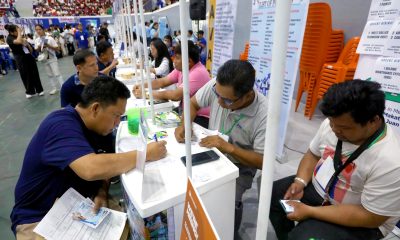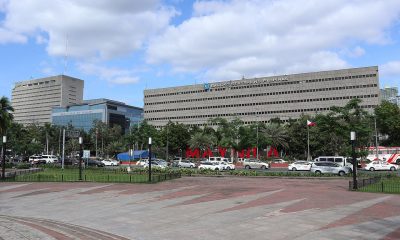Business and Economy
PHL tracking Malaysian economic trends—Yap

Philippines has to underline Collective Investment Scheme (CIS) to be able to catch up with Asian neighbors in the economic trends. (Photo: Congressman Arthur C. Yap/Facebook)
TAGBILARAN CITY, Bohol—Philippines has to underline Collective Investment Scheme (CIS) to be able to catch up with Asian neighbors in the economic trends.
Third District Rep. Arthur Yap, who chairs the House Committee on Economic Affairs, led a delegation of Philippine legislators comprising Reps. Jose Panganiban (Chair, Agriculture Committee), Cesar Sarmiento (Chair, Transportation Committee), Xavier Jose Romualdo (Vice-Chair, Trade and Industry Committee) and Janna S. Olladas (Committee Secretariat), to undertake studies and consultations with officials in Malaysia and Singapore, on relevant topics that they are working on in their respective and joint committees.
In his travel report, Yap said the CIS Law was a critical measure being passed by the House of Representatives in the Economic Affairs Committee.
He explained that a Collective Investment Scheme is any arrangement whereby funds are solicited from the investing public and pooled together for the purpose of investing, re-investing and/or trading in securities or other investment assets.
These are investment products such as Unit Investment Trust Funds, Mutual Funds, Investment Linked Insurance Plans, Money Market Funds, Hedge Funds, Capital Guaranteed Funds, Index Funds, Property Funds and such other investment instruments being offered by banks, securities and insurance companies.
“Today, the amount of funds in the Philippines invested in CIS has reached more than Php 1.5 trillion. Properly developed, these private funds can be packaged as Private Infrastructure Development Funds which can complement Government Funds for infrastructure investments,” according to Yap.
He cited that in Malaysia and Singapore, mature CISL markets are functioning.
“Malaysia’s combined market has raised about 5.3 trillion pesos worth of combined investments while Singapore had significantly more. Our visit to the regulatory agencies of both nations gave us a close look at their philosophies of how they encouraged people to invest in these funds as a retirement, estate and forced savings tool and how they are also protecting the rights of their investing publics,” Yap added.
Officials from both countries discussed their system and process of approvals for what instruments can be offered for CIS and Investment Linked Insurance Products, other permissible investments, fees and interest structures, disclosure reports to investors and policy holders, insurance and capital protection systems, restrictions and alike.
“We realized that in Malaysia, different regulatory agencies watched over different investment vehicles while in Singapore, these varying investment products were regulated alone by the Monetary Authority of Singapore (MAS). Even so, within the MAS, regulation was done by segregated departments.
In short: it was not so much as housing all the regulators in one agency as being proposed in the House Bills, but ensuring that all specific agencies are talking constantly and functioning as one with a high degree of coordination to watch over the funds and protect the investing public, while allowing the funds to be invested in their intended sectors,” Yap said.
He also said that Philippines could still take time to make adjustments and refinements for the bills at the House of Representatives taking these models into consideration.
“We must put special emphasis on ensuring that rules are not obstructive and the playing field is level especially in the areas of taxes so no arbitrage will result. Consumer protection through a compensation or insurance regime is also very critical. We need to enact our CISL soonest since ASEAN Economic Integration is underway and we do not want to be left behind. Already Thailand, Malaysia and Singapore have integrated markets for their CISL allowing cross-border investments and movement of funds,” according to Yap.
With this Law in place, Philippines can offer its investment products to a hungry regional and global market expanding the country’s capital market significantly overnight
“Effectively, this makes the private sector perfectly capable of functioning as the Government’s partner in development and investments instead of the Government raising all equity alone in major infra and allied projects from the National Budget and through loans,” Yap added.
The resource persons on CISL included Tan Sri Dato Seri Ranjit Ajit Singh (chairman of the Securities Commission of Malaysia) and officials of the Securities Commission Of Malaysia, Deputy Director Ooi See Eim of Bank Negara Malaysia (Malaysian Central Bank) and other officials and Deputy Managing Director Ong Chong Tee of the Monetary Authority of Singapore (MAS) and other key Officials.
Former Philippine Finance Secretary Jose Isidro Camacho joined the Singapore meeting and was instrumental in setting up these meetings.
On the REIT, Yap described that it as another scheme to build a stronger capital market.
A REIT is basically a company that owns and operates income producing real estate.
These can range from offices, to apartments, condominiums, shopping centers and hotels.
REITS can be publicly traded. In such a case, Ayala Land, Megaworld and such other realtors can create trusts over their income producing real estate for sale to the investing public.
In this way, developers can raise additional capital beyond loans and shareholder equity to continue their development activities.
For the public, REITS are an additional product to invest in for the short or long term, diversifying their portfolio.
“Unfortunately, the Philippine REIT Law, originally passed in 2009, languished into total uselessness when the DOF from 2010-2016 just blocked its use by writing provisions into the IRR which were not contemplated in the law. These include the high degree of public ownership required, imposing a VAT and minimum investments requirements. Slowly, the present DOF is revising the IRR to be compliant with the spirit and language of the law,” Yap said.
He added that resource persons in Singapore even said that “Philippines is very much delayed in implementing a REIT Law since the quality of our real estate is outstanding”.
“We have to get our reit law going! We have lost six valuable years for this sector to develop. With the developments in India, Thailand, Malaysia and Singapore today, we can learn from them and evolve the REITS to even include Business Trusts so that even cellular phone towers, toll roads, airports, power plants and alike, can be a subject of Trusts for Investments. In Singapore alone, 20% of the GDP is based on the REIT,” Yap said.
Upon returning from the trips, the Economic Affairs Committee called the attention of the Department of Finance on the status of the IRR’s completion.
Yap is also preparing to submit a bill on Business Investment Trusts.
The resource persons for the REIT included Peter Verwer, CEO of the Asia Pacific Real Estate Association Limited APREA and his staff; Loh Wai
Keong, managing director of GIC (Sovereign Wealth Fund of Singapore) and his staff; Simon Clark, tax partner of KPMG, and Martin Siah of Bank of America Merril Lynch.





















